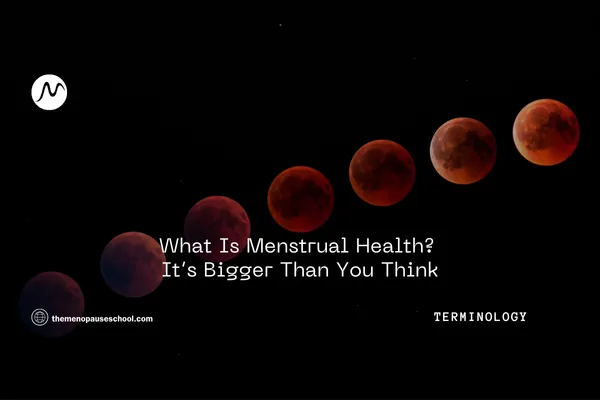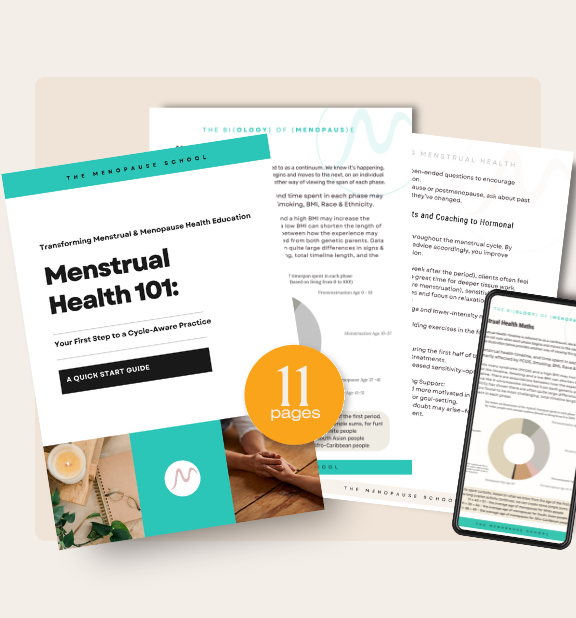Articles & Information
BLOG

What Is Menstrual Health?
When people hear “menstrual health,” they often think of periods, PMS, or fertility. But that’s just one part of a much wider picture.
Menstrual health is a whole-body, lifelong experience—an internal rhythm that influences everything from energy to emotional resilience.
The World Health Organization defines menstrual health as a "complete state of physical, mental, and social wellbeing in relation to the menstrual cycle—not just the absence of disease or pain".
And that changes everything.
It means menstrual health isn’t only about what happens during a bleed. It’s about the entire monthly rhythm—the hormonal shifts that shape energy, brain function, metabolism, sleep, digestion, immunity, mood, and more.
From the very first period to postmenopause
Menstrual health is one of the most sensitive indicators of what’s going on inside the body. It’s so sensitive, in fact, that many researchers now call it the fifth vital sign—alongside body temperature, heart rate, respiratory rate, and blood pressure.
Understanding menstrual health allows us to see patterns early. Irregular cycles, heavy bleeds, painful periods, skin flare-ups, mid-cycle fatigue, or late luteal anxiety are not random.
They’re messages. They’re signs of what your body needs more (or less) of.
This is why menstrual health matters to everyone—at every age:
It gives people who menstruate a lifelong tool for self-understanding.
It empowers healthcare practitioners to ask better questions and offer better care.
It opens the door to informed conversations about perimenopause and menopause—decades before they begin.
And while reproduction is a vital and powerful part of the story for many, it’s not the only role the ovaries play. The hormones they produce have far-reaching effects across all body systems, throughout the lifespan.
At The Menopause School, we believe menstrual health is the missing link in how we think, talk, and educate about female health. When we start from this definition, the entire system changes—for the better.
Because when people understand their cycle, they understand themselves. And when that happens, menstrual health becomes a foundation for life.

What Is Menstrual Health?
When people hear “menstrual health,” they often think of periods, PMS, or fertility. But that’s just one part of a much wider picture.
Menstrual health is a whole-body, lifelong experience—an internal rhythm that influences everything from energy to emotional resilience.
The World Health Organization defines menstrual health as a "complete state of physical, mental, and social wellbeing in relation to the menstrual cycle—not just the absence of disease or pain".
And that changes everything.
It means menstrual health isn’t only about what happens during a bleed. It’s about the entire monthly rhythm—the hormonal shifts that shape energy, brain function, metabolism, sleep, digestion, immunity, mood, and more.
From the very first period to postmenopause
Menstrual health is one of the most sensitive indicators of what’s going on inside the body. It’s so sensitive, in fact, that many researchers now call it the fifth vital sign—alongside body temperature, heart rate, respiratory rate, and blood pressure.
Understanding menstrual health allows us to see patterns early. Irregular cycles, heavy bleeds, painful periods, skin flare-ups, mid-cycle fatigue, or late luteal anxiety are not random.
They’re messages. They’re signs of what your body needs more (or less) of.
This is why menstrual health matters to everyone—at every age:
It gives people who menstruate a lifelong tool for self-understanding.
It empowers healthcare practitioners to ask better questions and offer better care.
It opens the door to informed conversations about perimenopause and menopause—decades before they begin.
And while reproduction is a vital and powerful part of the story for many, it’s not the only role the ovaries play. The hormones they produce have far-reaching effects across all body systems, throughout the lifespan.
At The Menopause School, we believe menstrual health is the missing link in how we think, talk, and educate about female health. When we start from this definition, the entire system changes—for the better.
Because when people understand their cycle, they understand themselves. And when that happens, menstrual health becomes a foundation for life.

What Is Menstrual Health?
When people hear “menstrual health,” they often think of periods, PMS, or fertility. But that’s just one part of a much wider picture.
Menstrual health is a whole-body, lifelong experience—an internal rhythm that influences everything from energy to emotional resilience.
The World Health Organization defines menstrual health as a "complete state of physical, mental, and social wellbeing in relation to the menstrual cycle—not just the absence of disease or pain".
And that changes everything.
It means menstrual health isn’t only about what happens during a bleed. It’s about the entire monthly rhythm—the hormonal shifts that shape energy, brain function, metabolism, sleep, digestion, immunity, mood, and more.
From the very first period to postmenopause
Menstrual health is one of the most sensitive indicators of what’s going on inside the body. It’s so sensitive, in fact, that many researchers now call it the fifth vital sign—alongside body temperature, heart rate, respiratory rate, and blood pressure.
Understanding menstrual health allows us to see patterns early. Irregular cycles, heavy bleeds, painful periods, skin flare-ups, mid-cycle fatigue, or late luteal anxiety are not random.
They’re messages. They’re signs of what your body needs more (or less) of.
This is why menstrual health matters to everyone—at every age:
It gives people who menstruate a lifelong tool for self-understanding.
It empowers healthcare practitioners to ask better questions and offer better care.
It opens the door to informed conversations about perimenopause and menopause—decades before they begin.
And while reproduction is a vital and powerful part of the story for many, it’s not the only role the ovaries play. The hormones they produce have far-reaching effects across all body systems, throughout the lifespan.
At The Menopause School, we believe menstrual health is the missing link in how we think, talk, and educate about female health. When we start from this definition, the entire system changes—for the better.
Because when people understand their cycle, they understand themselves. And when that happens, menstrual health becomes a foundation for life.
a free practitioner's guide
Menstrual Health 101
Key insights
Your First Step to a Cycle-Aware Practice

Start making a real impact today.

Why You Need This Guide
Explore how hormonal rhythms influence metabolism, mood, and well-being at every life stage
Discover how small, practical shifts in your approach can enhance client outcomes, build trust, and set you apart in your field.


